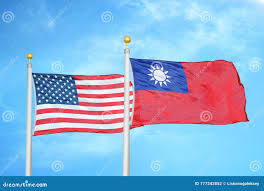by Martin Haffner Associate Editor
China Accuses US of ‘Backpedalling’ on Taiwan Independence Stance
Beijing, China – Tensions between China and the United States have flared again, this time over what Beijing perceives as a shift in Washington’s stance on Taiwan’s independence. China’s Foreign Ministry has issued a strongly worded statement accusing the US of “backpedalling” and attempting to obfuscate its true intentions regarding the self-governing island.
The core of the dispute lies in recent adjustments to the US’s official language concerning Taiwan. While the US maintains a policy of “strategic ambiguity,” neither explicitly confirming nor denying whether it would intervene militarily if China were to attack Taiwan, China believes that the US has historically adhered to the “One China” policy. This policy acknowledges the People’s Republic of China as the sole legal government of China and recognizes Taiwan as a part of China.
However, recent remarks from US officials and updates to official documentation have raised eyebrows in Beijing. Specifically, China is concerned about interpretations of the US’s commitment to Taiwan’s defense. While the US has always maintained a commitment to Taiwan’s ability to defend itself, China alleges that recent statements subtly hint at a weakening of the US’s adherence to the “One China” principle. They interpret these shifts as a deliberate attempt to move closer to recognizing Taiwan as a separate, independent nation.
“The US is attempting to play word games and manipulate the issue of Taiwan’s sovereignty,” a Foreign Ministry spokesperson stated in a press conference. “This blatant backpedalling on its commitment to the ‘One China’ policy is a dangerous move that could destabilize the region and jeopardize the delicate balance of relations.”
The spokesperson further emphasized that the issue of Taiwan is a core interest of China and that any attempt to undermine its sovereignty will be met with a firm and resolute response. They reiterated China’s commitment to peaceful reunification with Taiwan, but warned that Beijing reserves the right to take all necessary measures to prevent any attempts at formal Taiwanese independence.
The US has, thus far, not directly responded to China’s accusations. However, in previous statements, US officials have maintained that their policy on Taiwan remains unchanged. They insist that their commitment to Taiwan is firm and that they are dedicated to maintaining peace and stability in the Taiwan Strait.
The latest round of accusations and counter-accusations comes at a particularly sensitive time, with tensions already heightened due to other areas of disagreement between the two superpowers, including trade, human rights, and military activity in the South China Sea. This new dispute further complicates the already complex and often fraught relationship between the US and China, raising concerns about the potential for further escalation in the region.
Analysts predict that the issue of Taiwan will remain a central point of contention between China and the US in the foreseeable future, and that any perceived shift in the US’s stance will be met with swift and forceful condemnation from Beijing. This latest episode highlights the critical importance of clear and consistent communication between the two countries to avoid misinterpretations and prevent further deterioration of their already strained relationship.



